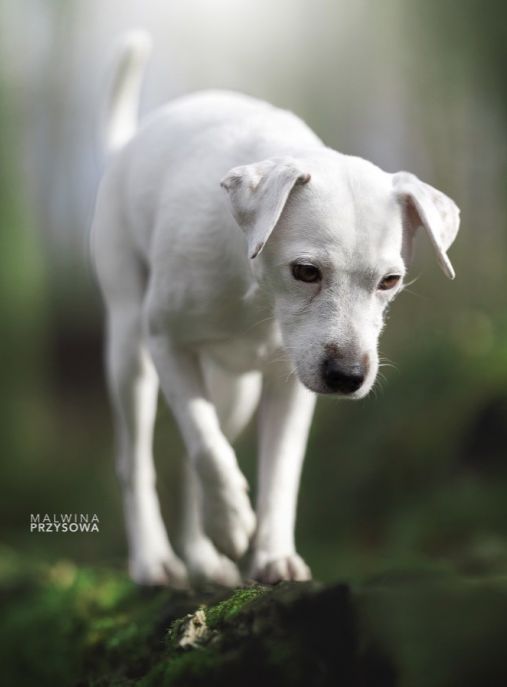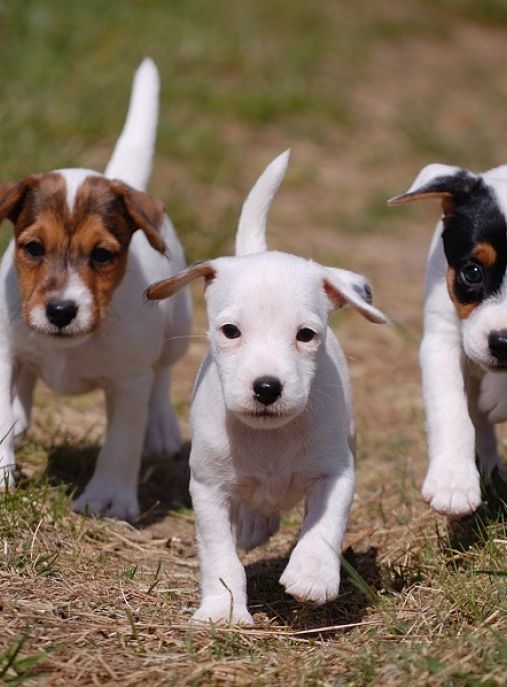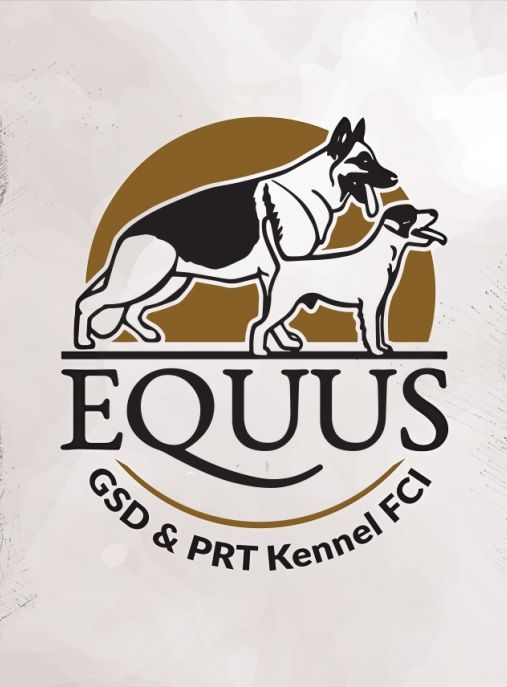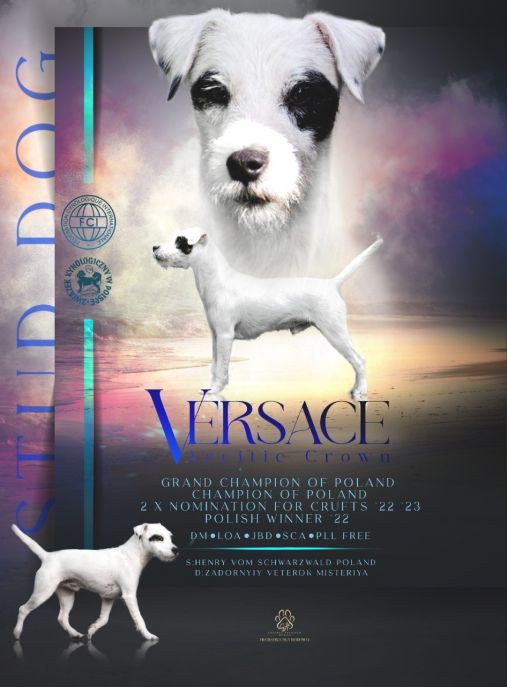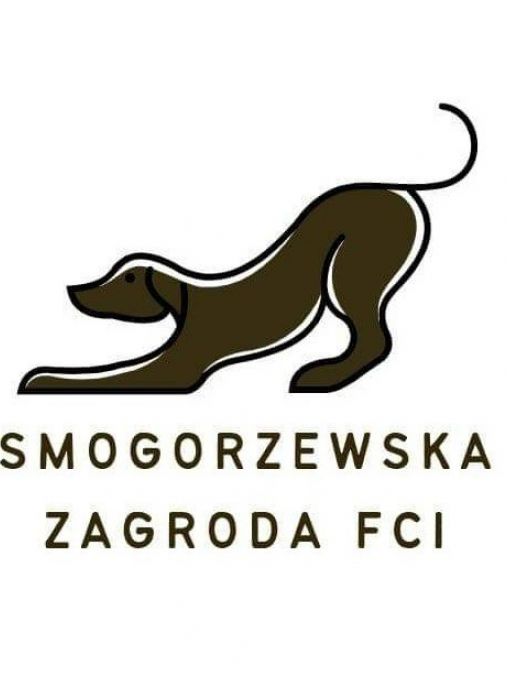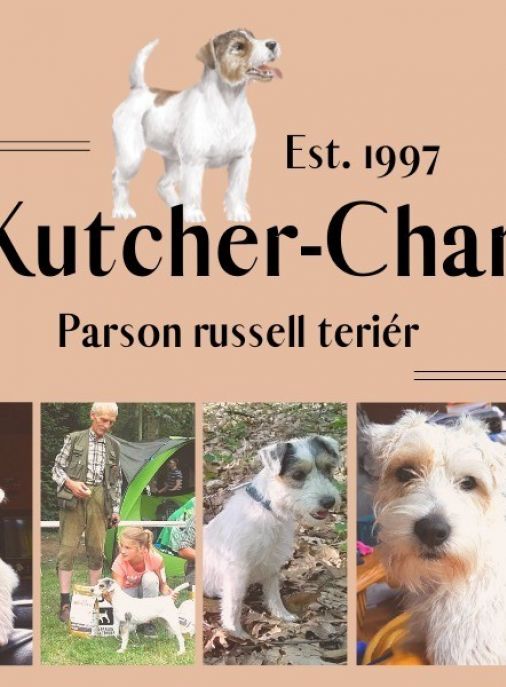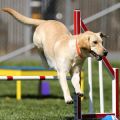The Parson Russell Terrier, also known as the Jack Russell Terrier, is a small and energetic dog breed that is beloved for its intelligence, agility, and charming personality. With their distinctive appearance and lively nature, these dogs have become popular companions and working dogs around the world. In this comprehensive description, we will delve into the history, characteristics, and interesting facts about the Parson Russell Terrier breed.
Originating in England in the 19th century, the Parson Russell Terrier was initially bred for fox hunting. Reverend John Russell, known as the "Parson Jack," played a significant role in developing this breed. He aimed to create a dog that could keep up with the horses during hunts, possessing the agility, stamina, and tenacity to flush out foxes from their dens. The breed's name was later changed to Parson Russell Terrier to honor its creator.
According to the FCI (Fédération Cynologique Internationale) typology, the Parson Russell Terrier belongs to Group 3: Terriers. This group includes various terrier breeds that share common characteristics such as a strong prey drive, high energy levels, and a fearless nature. Within this group, the Parson Russell Terrier is classified under Section 1: Large and Medium-sized Terriers.
Parson Russell Terriers are versatile dogs that excel in various roles. They are known for their exceptional hunting skills, making them excellent working dogs for activities like earthdog trials and ratting. Their intelligence and trainability also make them suitable for obedience competitions and agility trials. Additionally, their friendly and affectionate nature makes them wonderful family pets and companions.
In terms of physical characteristics, the Parson Russell Terrier is a small to medium-sized dog with a well-balanced and muscular build. They have a rectangular-shaped body, with a deep chest and a straight back. Their head is proportionate to their body, featuring a strong jaw, dark almond-shaped eyes, and V-shaped ears that fold forward. The breed's tail is traditionally docked, but in countries where docking is prohibited, it is left natural.
The Parson Russell Terrier's coat is dense, weatherproof, and predominantly white, with markings of black, tan, or both. This coat is relatively low-maintenance, requiring regular brushing to keep it clean and free from tangles. However, shedding can be moderate, so occasional grooming may be necessary.
On average, Parson Russell Terriers weigh between 13 to 17 pounds (6 to 8 kilograms) and stand at a height of 10 to 15 inches (25 to 38 centimeters) at the shoulder. Their life expectancy ranges from 13 to 15 years, although with proper care and a healthy lifestyle, some individuals have been known to live even longer.
One interesting fact about Parson Russell Terriers is their boundless energy. They are highly active dogs that require regular exercise to keep them physically and mentally stimulated. Daily walks, playtime, and interactive games are essential to prevent boredom and destructive behavior. Due to their hunting instincts, it is important to keep them on a leash or in a securely fenced area, as they may chase small animals.
Another notable trait of the Parson Russell Terrier is their intelligence. They are quick learners and thrive on mental challenges. Training sessions should be consistent, positive, and reward-based to keep them engaged. Early socialization is also crucial to ensure they grow up to be well-rounded and friendly dogs.
In conclusion, the Parson Russell Terrier is a lively and intelligent breed with a rich history rooted in hunting. Their versatility, compact size, and affectionate nature make them suitable for various roles, from working dogs to beloved family pets. With their striking appearance and energetic personality, Parson Russell Terriers continue to captivate dog lovers worldwide.
The Parson Russell Terrier, also known as the Jack Russell Terrier, is a small and energetic breed that possesses a unique character. With their lively and spirited nature, these dogs are full of personality and make for excellent companions. Let's delve into the extensive description of the character of Parson Russell Terrier dogs, including their behavior, how to raise them, and the best training methods.
Parson Russell Terriers are known for their intelligence and high energy levels. They are always on the go, ready for any adventure that comes their way. This breed thrives on mental and physical stimulation, making them ideal for active individuals or families who can provide them with plenty of exercise and playtime. They are natural athletes and excel in various dog sports such as agility, flyball, and obedience trials.
One of the defining traits of Parson Russell Terriers is their strong prey drive. Bred originally for hunting, they have a natural instinct to chase small animals. This can make them prone to chasing squirrels, rabbits, or even smaller pets if not properly trained and socialized. It is crucial to provide them with early socialization to ensure they can coexist peacefully with other animals.
Despite their small size, Parson Russell Terriers are fearless and confident. They are not afraid to take on challenges and can be quite stubborn at times. This breed requires a firm and consistent hand in training to establish boundaries and prevent them from becoming overly dominant. Positive reinforcement techniques, such as treats and praise, work best with these intelligent dogs.
When it comes to raising a Parson Russell Terrier, early socialization is key. Expose them to different environments, people, and animals from a young age to help them develop into well-rounded dogs. This will also help reduce any potential aggression or fearfulness towards strangers or unfamiliar situations. Additionally, providing them with plenty of mental and physical stimulation will help prevent destructive behaviors that may arise from boredom.
Parson Russell Terriers are known for their loyalty and affection towards their families. They form strong bonds with their owners and thrive on human companionship. However, they can be wary of strangers and may exhibit protective behavior. Proper socialization and training can help them differentiate between genuine threats and harmless situations, ensuring they remain friendly and approachable.
It is important to note that Parson Russell Terriers have a high prey drive and may not be suitable for households with small children or other small pets. Their energetic nature and tendency to chase can lead to accidental injuries. Supervision and careful introductions are necessary when introducing them to young children or other animals.
In conclusion, Parson Russell Terriers are lively, intelligent, and full of character. They require an active lifestyle, mental stimulation, and consistent training to thrive. With proper socialization and training, they can become well-behaved and loving companions. If you are looking for a small dog with a big personality, the Parson Russell Terrier may be the perfect match for you.
The Parson Russell Terrier, also known as the Jack Russell Terrier, is a small and energetic breed that requires specific care to ensure their well-being and happiness. Here are some tips on how to care for Parson Russell Terriers, including what to do and what not to do:
1. Exercise: Parson Russell Terriers are highly active dogs that need plenty of exercise to burn off their energy. Daily walks, playtime, and interactive toys are essential to keep them mentally and physically stimulated. However, avoid overexertion, especially in hot weather, as they can easily overheat.
2. Mental Stimulation: These intelligent dogs thrive on mental challenges. Engage them in puzzle toys, obedience training, and agility exercises to keep their minds sharp and prevent boredom. Mental stimulation is crucial to prevent destructive behaviors.
3. Grooming: Parson Russell Terriers have a short, dense coat that requires minimal grooming. Regular brushing with a slicker brush or grooming mitt will help remove loose hair and keep their coat healthy. They are not heavy shedders, but occasional baths and nail trims are necessary.
4. Socialization: Early socialization is vital for Parson Russell Terriers to develop into well-rounded dogs. Expose them to various people, animals, and environments from a young age to ensure they grow up to be confident and friendly. Proper socialization helps prevent fear-based aggression.
5. Training: Parson Russell Terriers are intelligent and independent thinkers, which can make training a challenge. Use positive reinforcement techniques, such as treats and praise, to motivate them. Consistency, patience, and firmness are key to successful training. Avoid harsh punishment or negative reinforcement, as it can damage their trust and hinder progress.
6. Health Care: Regular veterinary check-ups, vaccinations, and preventive treatments are essential for the overall health of your Parson Russell Terrier. They are generally a healthy breed, but like all dogs, they can be prone to certain conditions such as patellar luxation, deafness, and lens luxation. Regular dental care, including brushing their teeth, is also important to prevent dental issues.
7. Diet: Provide a balanced and nutritious diet suitable for your Parson Russell Terrier's age, size, and activity level. Consult with your veterinarian to determine the appropriate portion sizes and feeding schedule. Avoid overfeeding, as Parson Russell Terriers can easily gain weight, which can lead to health problems.
8. Safety: Parson Russell Terriers have a strong prey drive and may chase small animals. Ensure they are always on a leash or in a securely fenced area to prevent them from running off or getting into dangerous situations. Also, be cautious with open doors or windows, as they are skilled escape artists.
9. Avoid Boredom: Parson Russell Terriers are prone to boredom, which can lead to destructive behaviors. Provide them with plenty of toys, rotate them regularly to keep things interesting, and engage in interactive play sessions. Consider puzzle toys or treat-dispensing toys to keep them mentally stimulated.
10. Family Interaction: Parson Russell Terriers are social dogs that thrive on human companionship. They enjoy being part of the family and should not be left alone for extended periods. Ensure they receive plenty of love, attention, and quality time with their human family members.
Remember, each Parson Russell Terrier is an individual, and their care may vary slightly. Always observe your dog's behavior, consult with a veterinarian, and adapt their care accordingly. With proper care, love, and attention, your Parson Russell Terrier will be a happy and healthy companion for many years to come.
The Parson Russell Terrier, a small and energetic breed, is known for its distinctive coat color. The common color of Parson Russell Terrier dogs is predominantly white, with patches or markings of various shades. This breed's coat color is often described as "predominantly white with markings."
The white color of the Parson Russell Terrier's coat is usually the base color, covering most of the body. It is a bright and pure white, giving the dog a clean and crisp appearance. This white coat serves as a canvas for the unique markings that make each Parson Russell Terrier truly one-of-a-kind.
The markings on a Parson Russell Terrier can come in a variety of colors, adding character and charm to their overall appearance. The most common colors seen in their markings include black, tan, and brown. These colors appear in patches or spots, creating a beautiful contrast against the white background.
Black markings are often found on the head, ears, and tail of the Parson Russell Terrier. These black patches can be solid or may have a speckled or brindle pattern. The black color adds depth and definition to the dog's facial features, making their expressive eyes stand out.
Tan markings are commonly seen on the eyebrows, cheeks, chest, and legs of the Parson Russell Terrier. These tan patches can range from a light sandy color to a rich, deep tan shade. The tan color complements the white coat, giving the dog a warm and inviting appearance.
Brown markings, although less common, can also be found on the Parson Russell Terrier's coat. These brown patches are usually seen on the face, ears, and body. The brown color can vary from a light caramel shade to a darker chocolate brown, adding a touch of earthiness to the overall color scheme.
It is important to note that while the common color of Parson Russell Terrier dogs is predominantly white with markings, there can be variations within the breed. Some Parson Russell Terriers may have more extensive markings, while others may have fewer or even no markings at all. Each dog's coat is unique, and the specific color and pattern can vary from one individual to another.
In conclusion, the common color of Parson Russell Terrier dogs is predominantly white, with patches or markings of black, tan, and brown. This combination of colors creates a striking and eye-catching appearance, highlighting the breed's playful and lively nature. Whether it's the bright white coat or the contrasting markings, the Parson Russell Terrier's coloration is undeniably beautiful and adds to their overall charm.
The Parson Russell Terrier, also known as the Jack Russell Terrier, is a small and energetic breed that requires proper care and attention to maintain good health. While generally a robust breed, they are prone to certain health issues that owners should be aware of to ensure their well-being.
One of the most common health concerns in Parson Russell Terriers is patellar luxation. This condition occurs when the kneecap slips out of its normal position, causing discomfort and lameness. Regular exercise and maintaining a healthy weight can help prevent this condition. If diagnosed, surgical intervention may be necessary to correct the issue.
Another common health problem in this breed is lens luxation, which is the displacement of the lens within the eye. This can lead to vision impairment or even blindness. Regular eye examinations by a veterinarian are crucial to detect any early signs of lens luxation. In severe cases, surgery may be required to prevent further complications.
Parson Russell Terriers are also prone to allergies, both food and environmental. Allergies can manifest as skin irritations, itching, and gastrointestinal issues. Identifying and eliminating the allergen from their diet or environment is essential to manage these allergies. Consultation with a veterinarian can help determine the best course of action, which may include dietary changes or medication.
Dental health is another area that requires attention in Parson Russell Terriers. Like many small breeds, they are prone to dental problems such as periodontal disease and tooth decay. Regular brushing of their teeth, providing dental chews, and scheduling professional dental cleanings can help maintain good oral hygiene and prevent dental issues.
As an active breed, Parson Russell Terriers require regular exercise to keep them physically and mentally stimulated. Daily walks, playtime, and interactive toys are essential to prevent boredom and destructive behavior. However, it is important to avoid excessive exercise, especially in puppies, as their bones are still developing. Overexertion can lead to joint problems later in life.
Proper nutrition is vital for the overall health of Parson Russell Terriers. A balanced diet that meets their nutritional needs, including high-quality protein and appropriate fat levels, is essential. Avoid overfeeding to prevent obesity, which can lead to various health issues, including joint problems and heart disease.
Regular veterinary check-ups are crucial for the well-being of Parson Russell Terriers. Routine vaccinations, parasite prevention, and early detection of any health issues are essential. Additionally, spaying or neutering is recommended to prevent reproductive-related health problems and unwanted litters.
In conclusion, while Parson Russell Terriers are generally healthy dogs, they are prone to certain health conditions that require attention. Regular exercise, proper nutrition, dental care, and veterinary check-ups are essential for maintaining their health. By being proactive and attentive to their needs, owners can ensure that their Parson Russell Terriers lead happy and healthy lives.
The Parson Russell Terrier is a small, energetic, and intelligent breed known for its lively personality and boundless energy. To ensure their overall health and well-being, it is crucial to provide them with a balanced and nutritious diet. Proper nutrition plays a vital role in maintaining their energy levels, supporting their immune system, and promoting healthy growth and development.
When it comes to feeding a Parson Russell Terrier, it is important to choose high-quality dog food that meets their specific nutritional needs. Look for a dog food that is specifically formulated for small breeds, as they have different requirements compared to larger dogs. The food should contain a good balance of proteins, fats, carbohydrates, vitamins, and minerals.
Protein is an essential component of a Parson Russell Terrier's diet as it helps in muscle development and repair. Look for dog food that lists a high-quality source of animal protein, such as chicken, turkey, or fish, as the main ingredient. Avoid dog foods that contain excessive amounts of fillers or by-products, as they provide little nutritional value.
Fats are another important component of a Parson Russell Terrier's diet. They provide a concentrated source of energy and help in the absorption of fat-soluble vitamins. Look for dog food that contains healthy fats, such as omega-3 and omega-6 fatty acids, which are beneficial for their skin and coat health. Sources of healthy fats include fish oil, flaxseed, and chicken fat.
Carbohydrates are a source of energy for dogs, but it is important to choose complex carbohydrates that provide sustained energy rather than simple sugars. Look for dog food that contains whole grains like brown rice or oats, as they are more nutritious than refined grains.
In addition to a balanced diet, it is important to provide your Parson Russell Terrier with fresh water at all times. Hydration is crucial for their overall health and helps in maintaining proper digestion and body temperature.
While it is important to provide a nutritious diet, there are certain foods that should be avoided as they can be harmful to Parson Russell Terriers. Some common foods that are toxic to dogs include chocolate, grapes, raisins, onions, garlic, and certain artificial sweeteners like xylitol. These foods can cause various health issues ranging from gastrointestinal upset to organ damage, so it is best to keep them out of reach.
It is also important to avoid overfeeding your Parson Russell Terrier, as they are prone to weight gain. Obesity can lead to various health problems, including joint issues, diabetes, and heart disease. Follow the feeding guidelines provided by the dog food manufacturer and monitor your dog's body condition to ensure they maintain a healthy weight.
In conclusion, providing a Parson Russell Terrier with a balanced and nutritious diet is essential for their overall health and well-being. Choose high-quality dog food specifically formulated for small breeds, ensuring it contains a good balance of proteins, fats, carbohydrates, vitamins, and minerals. Avoid toxic foods and overfeeding, and always provide fresh water. By following these guidelines, you can help your Parson Russell Terrier lead a healthy and happy life.

